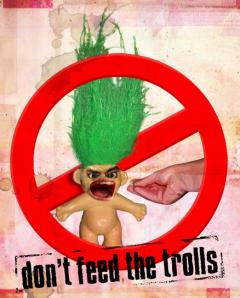Jezebel has a pretty good piece up about feminist men and what “we” (by which I take it the author means feminist women) want from them. Some excerpts:
[E]ven allegedly unfunny feminists acknowledge how extra-dry fighting sexism can be, and so we hope that when men join us, they, too can have a good, not always so self-serious laugh about gender roles and the complications in working to level the playing field….That said, it’s nice when a dude can see how utterly unjust the way women are still treated the world-over, and get a little pissed about it.
[…]You don’t have to call yourself a feminist to be welcome at this party. Not every dude is going to fly the feminist flag proudly, and that’s totally cool (not to mention, lots of kickass women don’t identify as feminists either).
[…]We don’t care how you got here, as long as you mean it. That means no sensitive ponytail man schtick to get more ‘tang. I’m sure more than one woman has met a male feminist who seems a little too preoccupied with our safety, a little too willing to jump in and rescue us, a little too into the narrative of the vulnerable woman and the man who’s here to show her he’s not like those “other guys.” Gross. Women need men who want to work as our equals and helpmates, not our protectors and guardians.
[…]You don’t have to be perfect….Feminism is about change and progress, and unpacking prejudice, not hairsplitting the backstory of every person who is out there saying good things.
[…]Dudes are important influences on other dudes when it comes to changing how gender divides us, and men who support these advances shouldn’t be afraid to point out when something is utterly sexist and bullshit.
[…]Don’t be afraid to challenge masculinity….When men show a comfort level with the spectrum gender exists on, it shows other men that gender isn’t binary, and redefines what being a “man” is anyway.
I think the piece brings up a lot of really good points, especially the one about not having to be perfect. Something I hear from many progressive men is a lot of anxiety about being “good feminists” and toeing the party line. My advice would be to not rely entirely on Internet Feminists for validation and criticism; try to find some trustworthy female feminist friends that you can ask for feedback that is actually constructive, as opposed to the destructive and counterproductive “call-outs” you see online. That said, if you’re a male feminist and a ton of women keep telling you that they disagree with a particular stance you have or feel uncomfortable with something you’re saying or doing, then it may be time to seriously reevaluate it.
The point about labels is also important. Many men call themselves “pro-feminists” or “feminist allies”; that’s cool. I’ll even accept the “humanist” and “equalist” and “egalitarian” thing as long as you don’t refuse to acknowledge that, in most societies and for most of history, men have had privilege over women. Ultimately, what you do matters much more than what you call yourself.
I have some suggestions of my own to add to Jezebel’s list. Note that these are my personal suggestions; the typical disclaimer that I Do Not Represent Feminism Unless Someone Has Nominated Me For Official Ambassador Of Feminism Without My Knowledge applies.
1. Do not lecture women about their own oppression.
Something really awkward that happens fairly often is when a feminist guy comes across an anti-feminist woman and proceeds to lecture her about how sexism is still hurting women and how she needs to be a feminist. Although the guy might be correct in this situation, and I would probably agree with him, feminist men should be mindful of the fact that most women spend our entire lives getting talked down to by men who think they’re experts on our personal experiences. If a woman says she hasn’t been impacted by sexism and doesn’t need this feminism stuff, perhaps respectfully point her to some resources on sexism and agree to disagree. It’s not your place to tell her how to interpret her own life, because even though you’re probably right, she can easily just tell you that she knows her own situation better than you do. And she’ll be right, too.
This, by the way, applies to all allies. White people shouldn’t lecture people of color about their own oppression. Straight people shouldn’t lecture queer people about their own oppression. And so on. Patrick put this really well:
it’s not my job to tell woman-identified persons how to be feminists, even if I disagree with something they have said. My job is to talk to male-identified persons, and *with* people who are not male-identified.
2. Understand and try to accept that you will not always be welcome in all feminist spaces.
Yeah, I get that it really sucks when you know that you’re a caring, informed, supportive ally, but some of the people you’re trying to ally yourself with still don’t necessarily want to include you all of the time. Personally, I believe that the vast majority of feminist activism should include people of all genders, but I also understand that many non-male people who are struggling to overcome the effects of sexism on their lives–harassment, assault, abuse, discrimination–need spaces in which they can feel safe, and sometimes feeling safe means being away from men. As a feminist guy, please try to understand that, even if it hurts to feel “rejected” from these groups or events.
3. Don’t expect a cookie.
I know this sounds harsh, but you are not entitled to extra praise or attention from women because you’ve deigned to support issues that are important to them. You may get that extra praise and attention in due course, though, and that’s great. And, luckily, most of the feminist men I know aren’t like this at all. In fact, many of them have told me that it’s actually almost uncomfortable when women tell them what wonderful people they are for supporting causes like reproductive rights or rape prevention. They feel that they’re doing the bare minimum of being a decent human being, but many women, accustomed to male friends, family members, and partners who treat feminism with hostility, feel compelled to praise guys who see it differently.
To sum it up, you probably will get a cookie respect and admiration from women. You just shouldn’t feel entitled to it.
4. Remember that your feminist credentials don’t mean you can pretend to be a sexist.
Just because you’re a badass feminist doesn’t mean that people are necessarily going to feel okay with you making sexist jokes “ironically” and “reclaiming” words like bitch and slut. If you do something like that and are asked to stop, your response should not be “Yeah well you know I’m totally a feminist!” You should either stop, or accept that the people you’re hurting with your language are not obligated to continue interacting with you.
(Of course, people really vary on this. When I genuinely trust people, men included, there’s actually very little they can say that would offend me. I have plenty of male friends who make sandwich jokes to me and I find them hilarious, not because “hur hur women can’t do anything but cook and clean and serve men” but because I trust these guys so much that the irony actually reads as irony. )
But the fact that you’re a Bona Fide Feminist Dude doesn’t mean that non-male people are required to be comfortable with everything you say and do, especially if it involves stuff that can read as sexism to those who don’t know you very well.
5. Use feminism to address issues that affect men.
Men are harmed by sexism in many of the same ways as women are (gender roles, for example). In some ways, though, their issues are a bit different. Because men make up such a substantial part of the prison population, they are more likely to become the victims of sexual assault in prison, and, in general, male victims of sexual assault face unique and serious difficulties in understanding what happened to them, speaking out, and seeking justice. Men are more likely to be the victims of violent crime and police brutality. And where being male intersects with marginalized identities, such as being queer, trans*, non-white, disabled, or poor, these issues become even more pronounced.
Many people (not just men) have noticed this and, unfortunately, decided to blame it all on women and feminism. These are called MRAs, but what they advocate for isn’t really “men’s rights” at all. It’s just anti-feminism.
MRAs do rightfully point out that non-male feminists don’t spend a lot of time addressing uniquely “male” issues. While I think that addressing power differentials in society will eventually bring about equality for everyone, I do think that these issues are important and should be discussed.
But women can’t take leadership of efforts to address problems that they have never experienced. I can’t tell people what it’s like to be a male rape victim–or how to support male rape victims–because I am not one and can never be one. Men, however, can use the “toolbox” of feminism–examining power differentials, paying attention to intersectionality, critiquing pop culture, etc.–to advocate for their own causes. That’s why we need feminist men who will be allies to non-male feminists while also leading initiatives to support other men, reduce violence against men, and eradicate sexism for everyone.
Edit: Alright, alright, I was just kidding about the damn cookies. Here, have one.









